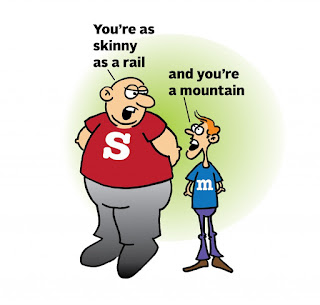HYPERBOLE
Hyperbole Definition
Hyperbole,
derived from a Greek word meaning “over-casting” is a figure of speech, which
involves an exaggeration
of ideas for the sake of emphasis.
It is a device
that we employ in our day-to-day speech. For instance, when you meet a friend
after a long time, you say, “Ages have passed since I last saw you”. You may
not have met him for three or four hours or a day, but the use of the word
“ages” exaggerates this statement to add emphasis to your wait.
Therefore, a hyperbole is an unreal exaggeration to emphasize the real
situation. Some other common Hyperbole examples are given below.
Common Examples of Hyperbole
- My grandmother is as old as the hills.
- Your suitcase weighs a ton!
- She is as heavy as an elephant!
- I am dying of shame.
- I am trying to solve a million issues these days.
It is important
not to confuse hyperbole with simile
and metaphor. It does make a comparison but unlike simile and metaphor, hyperbole has a
humorous effect created by an overstatement.
Hyperbole is a figure of speech that uses an exaggerated or
extravagant statement to create a strong emotional response. As a figure of
speech it is not intended to be taken literally. Hyperbole is frequently used
for humour. Examples of hyperbole are:
- They ran like greased lightning.
- He's got tons of money.
- Her brain is the size of a pea.
- He is older than the hills.
- I will die if she asks me to dance.
- She is as big as an elephant!
- I'm so hungry I could eat a horse.
- I have told you a million times not to lie!
The media and
the advertising industry often use hyperbole (which may then be described as
hype or media hype).
Hyperboles Add Excitement and Fun
A boring story
can come to life or become comical with the use of a hyperbole. Some examples
of hyperboles include:
- “I’ve told you a million times”
- “It was so cold, I saw polar bears wearing jackets”
- “She is so dumb, she thinks Taco Bell is a Mexican phone company”
Here are some
common examples of hyperboles:
- I am so hungry I could eat a horse.
- I have a million things to do.
- I had to walk 15 miles to school in the snow, uphill.
- I had a ton of homework.
- If I can’t buy that new game, I will die.
- He is as skinny as a toothpick.
- This car goes faster than the speed of light.
- That new car costs a bazillion dollars.
- We are so poor; we don’t have two cents to rub together.
- That joke is so old, the last time I heard it I was riding on a dinosaur.
- They ran like greased lightning.
- He's got tons of money.
- You could have knocked me over with a feather.
- Her brain is the size of a pea.
- He is older than the hills.
References










